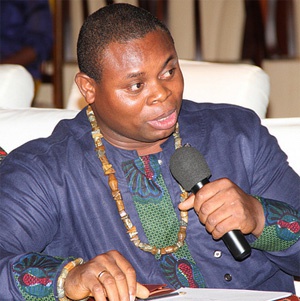IMANI, a policy think tank based in Ghana, is alleging that the Ghanaian government has clandestinely contracted the services of an American based lobbyist firm, Jefferson Waterman International, to promote a positive image of the West African country, in spite of the severe economic challenges at home.
According to a statement by IMANI, the contract is likely to cost the Ghanaian government more than 5 million Ghana Cedis (Ghc).
The statement said the government failed to seek the advice of the Attorney General before signing the agreement.
Ghana has written to the International Monetary Fund for a programme to inspire confidence in her economy, following a rapid depreciation of the country’s currency, the Cedi, against the Dollar and other currencies of international trade.
Below are details of the statement by IMANI.
IMANI Alert: Gov't, Why Spend Millions on American Lobbyists?
August 17th, 2014
The recent crisis of stranded Ghanaians in Libya has brought our country’s foreign policy into perspective.
In a routine monitoring of Ghana’s overseas diplomatic activities, IMANI picked up that the country has returned to the practice of engaging American lobby firms to represent its interests in the United States.
This was curious because the ruling party, when in Opposition, stridently criticised the practice, questioned the value, and lamented the amount of money spent on such exercises. They argued that the maintenance of a full diplomatic mission in the United States (in both New York and Washington DC, in fact) was sufficient to represent the full range of our interests in the United States, not least also because of the large diaspora of Ghanaian professionals, many of whom have deep connections across the political and economic landscape in that country.
Given that this matter of paid lobbyists has come up before one would have expected greater transparency on the part of the Administration in handling this matter. Yet, the Government did not so much as publish a single announcement. There was no international competitive bidding. Even if not by advertisement in the international press, a qualified bidding process could have been done by inviting several eligible lobby firms to submit expressions of interest.
Instead, we had to learn that Ghana has engaged Jefferson Waterman International (JWI) through compulsory disclosure requirements imposed on American lobby firms by US law.
We are reliably informed that the Attorney General was not asked for advice on whether this being an ‘international contract’ due Parliamentary process might apply
We believe that the Ghanaian public need a confirmation or denial of this engagement.
We are by this short brief aiming to compel the Government to address these preliminary concerns if indeed they confirm the existence of this JWI contract:
1. Will the government do the honourable and democratic thing by publishing the contract for all of us to know what exactly the scope of engagement is?
2. In the absence of a copy of the contract in the public domain, we have gathered that this contract will cost Ghana more than the Whitaker Group one. That in fact it will cost us per year more than 5 million Ghana Cedis (GHS). Is this true?
3. Is it true that JWI claims it shall be helping us with the Millennium Challenge Account (MCA) process? That work was in the scope of engagement of the Whitaker contract, and we are all aware that work on MCC has long been done, in fact there was only technical work standing between Ghana and a new MCA Compact, not fresh lobbying. The US authorities had no need of lobbying firms telling them about Ghana’s positives as they already knew of the country’s track record in managing the first compact.
4. Or is the assumption that our international reputation, especially in the US, has deteriorated to the extent that only lobbyists can save a deal already in the works?
5. We reached out to some of Ghana’s senior career Foreign Service professionals. We are certain that the contract was not reviewed by senior civil servants at the Ministry of Foreign Affairs, and that the input of our North America specialists were neither sought nor included. Is it true that every aspect of the engagement was designed by JWI and sent to the Flagstaff House for rubber-stamping by the deal’s cheerleaders?
D Did the Government take careful note of the experience of Gambia, which after spending millions of dollars on a deal with JWI found out that few concrete results were being delivered, and consequently had to abrogate the contract?
6. What tangible output has been realised so far from our engagement with JWI?
These are reasonable questions, and we hope the Government shall respond to them, so that IMANI can make up its mind the direction to take this potential advocacy initiative.
General News of Sunday, 17 August 2014
Source: starrfmonline.com
Gov’t secretly contracts American lobbyist firm – IMANI
Entertainment
















